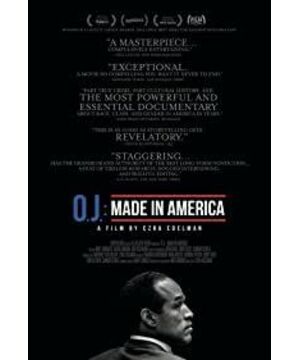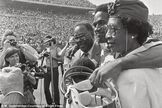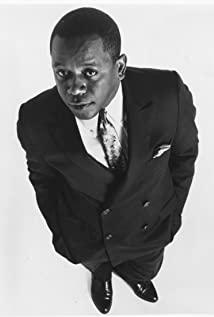After sobering up the next day, I thought that I should write an article to organize my thoughts, but the five episodes have so much information and so many highlights, which aspect is the most worthy of further study.
The title I originally wrote was, "The Simpsons: Made in America or Farce in America," and I mainly wanted to discuss the social issues of film refraction. But on second thought, I don't have a deep understanding of the United States, and I just start thinking based on the film's theory and the fragmented information accumulated in peacetime. Is this objective?
One thing is for sure, and that is that I completely believe in the story The Simpsons: Made in America builds. Let's take a look at how Baidu Encyclopedia introduces the Simpson case:
In 1994, the former American football player OJ Simpson's wife murder case became the most sensational event in the United States at that time. The trial of the case was twists and turns at the time. OJ Simpson (OJ Simpson) was charged with two counts of first-degree murder in the stabbing of his ex-wife and restaurant waiter Lang Goldman, due to several major police mistakes. The failure of strong evidence, He was acquitted and held only civilly responsible for the deaths of the two. The case has also become the largest criminal case in U.S. history.
On July 20, 2017, former famous American football star OJ Simpson, who was sentenced to 33 years in prison for armed robbery, was serving a sentence in a Nevada prison, and was approved by the parole board and will be released in the near future.
Encyclopedia's introduction is more objective, and basically lists some facts. The film "Simpson: Made in America" also looks very objective. It generally introduces Simpson's life experience according to the timeline, and always allows interviewers from both sides to express their positions on controversial issues. But movies are all symbolic languages, coupled with the associations and hints of montages, what we see are all stories that have been set in a direction, it is just a question of whether and how to convince you. The Simpsons: Made in America has been very successful in this regard.
Parallel narratives and contrasts: The biggest feature of The Simpsons: Made in America is the extensive use of parallel narratives. For example, there are always two lines in the first episode, one is how Simpson became a superstar in American football, and the other is the affirmative movement of black groups at the same time. Simpson's dark skin and his attitude of lightening his skin tones to emphasize his personal identity create a contrasting effect of the parallelism of the two lines. The same narrative technique appeared in the second episode, but the stories of both lines have been upgraded at this time: on the one hand, Simpson’s status has been upgraded, not only the darling of the sports industry, but also cross-border business circles and entertainment circles. Celebrities; on the other hand, there were several vicious racial discrimination incidents in American society during the same period, and the anger of the black community was escalating. The contrast between Simpson's personal ease and the existence of the black community intensifies in this episode.
The third episode is a bloody murder and Simpson's "different" arrest. After the foreshadowing of the first two episodes, the climax of the character story in this episode appears. Taking race a step further, Simpson takes center stage on the domestic violence of his white wife and their love-hate relationship. But what impressed me the most was that the film used a long section to show a piece of historical material, that is, the complete image of Simpson driving to his home under the pursuit of the police, and finally surrendering to the police and being arrested. The data screen itself is indeed eye-catching, but it is obvious that the film is showing this part of the scene. I think this is critical. If this clip is told at a fast pace, you will be more inclined to think that Simpson is struggling purely irrationally; but the longer it goes on, the more it becomes a tug of war full of doubts. Following the rhythm and guidance of the film, you will be inclined to Question the handling of the police, question Simpson's motives, guess Simpson's abacus.
Episodes 4 and 5 can be said together, because the foreshadowing of the first three episodes starts to explode in these last two episodes. From the character level, we have formed an understanding of Simpson in the first three episodes, which is strong, emotionally intelligent, ambitious, and emphasizes the individual over race. So we find it ironic when Simpson, as someone who downplays racial issues, ends up benefiting from the racial card in court; his reluctance to move from white to black social circles after his acquittal makes us feel that he is both pitiful and powerful; He was re-arrested for robbery, and we felt he deserved and deserved sympathy when he was given a disproportionately heavy sentence. At the social level, two major reversals have been achieved. In the first turn, after a long history of being oppressed, the black community achieved the long-awaited "fairness" in the Simpson case, thinking it was a powerful blow to the oppressive rule of white people for many years; in the second turn, when Simpson was arrested for robbery again , with a normal sentence of two years for the crime and 33 years for the offense. This, in turn, was seen as a retaliatory pushback from the whites. Under the foreshadowing of history, the case itself was placed in the torrent of the times, far beyond its own significance.
The Simpson case has been covered in the world's media, but this five-part documentary produced by ESPN stands out. They start from a character, a trial, and combine the twists and turns of the black affirmative movement to construct a grand chapter. Created a convincing and thought-provoking world. Shocking and intriguing should be the best realm of effect.
View more about O.J.: Made in America reviews











